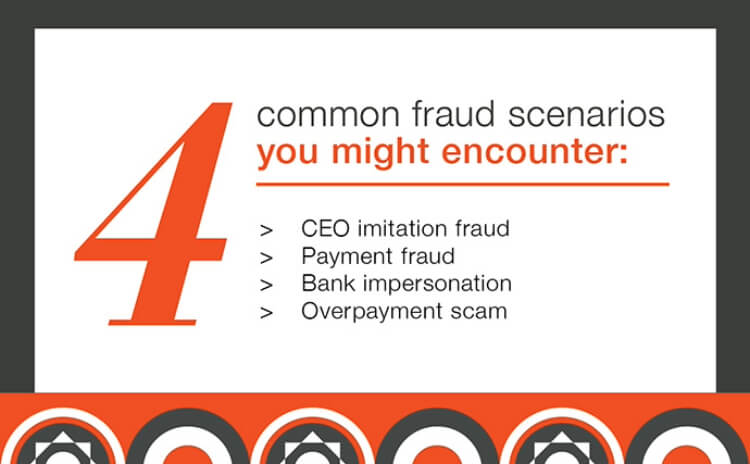Here are 4 common fraud scenarios you might encounter
Whether you’re a business owner, employee, or everyday consumer, the threat of fraud is increasingly important to be aware of. If you’ve never been the victim of fraud, it might be hard to imagine this happening to you. But letting your guard down is the easiest way to land yourself or your business in steep financial trouble.
To help you understand the warning signs of common types of scams, we’ve outlined some common fraud scenarios so you know what to look for and how you can be prepared.

CEO imitation fraud
In a business setting, whether you’re the head of the company or an employee, a fraudulent actor might try a version of email phishing in which they impersonate the CEO - or another high-ranking employee - of your company. For example, let’s say you’re an employee at a company and you receive an email, seemingly from the CEO. This email will impersonate the CEO and use an email address that is slightly different from the CEO’s actual email domain, and the impersonator is likely seeking sensitive information from you. So, the first red flag would be the email address of the sender. The next red flag would be a request to provide sensitive information or initiate a payment of any kind. If this ever happens, don’t respond or click any links or attachments, and report the email to your IT department. If you’re ever unsure, always reach out directly to the person being impersonated to see if it’s legitimate.
Payment fraud
Payment fraud can impact just about anyone at any time. This type of fraud refers to any instance in which a criminal uses stolen payment information to make unauthorized purchases. The main types of payment fraud are credit and debit card fraud, check fraud, wire transfer fraud, and mobile payment fraud. In our digital era, whether you’re a business owner or an individual consumer, fraudsters have more opportunities to get a hold of your sensitive information. Using chip cards, enabling two-factor authentication for mobile banking, adding tools like Positive Pay to your business accounts for automatic monitoring, and regularly reconciling your account activity are some of the most effective ways to reduce your vulnerability and protect your assets.
Bank impersonation
Let’s say you get an email or text from someone who appears to be affiliated with your bank. They might be letting you know about an enticing offer or raising the alarm about an urgent issue with your bank account. To proceed, they ask for sensitive account information in a manner that seems legitimate, given that they work for your bank. A situation like this is known as impersonation fraud, where someone attempts to solicit sensitive information from you under the guise of working for your bank. Typically, banks don’t contact you in this manner, so any emails or texts asking for sensitive information or informing you of an urgent matter are likely scams. If you’re unsure, it’s best to contact your bank directly via phone or online through your account to determine the legitimacy. Less tech-savvy individuals and senior citizens can be particularly vulnerable to this scam, so it’s important to teach your older relatives and friends about this potential threat.
Overpayment scam
If you ever sell goods or services online, you’ll want to be wary of this type of fraud. Overpayment scams occur when you sell a good or service and the buyer sends a fraudulent check in an amount greater than what you charged. This prompts the scammer to request a refund in the amount they paid in excess, appealing to your good faith. After sending back the refund amount, you go to deposit the check they sent and realize it’s fraudulent, and you’re out the money as well as the good or service you provided to the scammer. To avoid this type of fraud, always be wary of a buyer you’re working with. If it’s a significant purchase, legitimate buyers would likely want to meet in-person. If that’s not feasible, request payment via cash or a check that can be drawn at a local branch so you can confirm the validity.
It can happen to anyone
A key takeaway when it comes to fraud prevention is realizing that it can happen to just about anyone in any setting. From running a business to completing everyday transactions and everything in between, having a heightened awareness and understanding of the different types of threats can save you from significant financial losses.
From debit card protections to treasury management business solutions, Westfield Bank provides comprehensive tools and services for enhanced security on all transactions.



